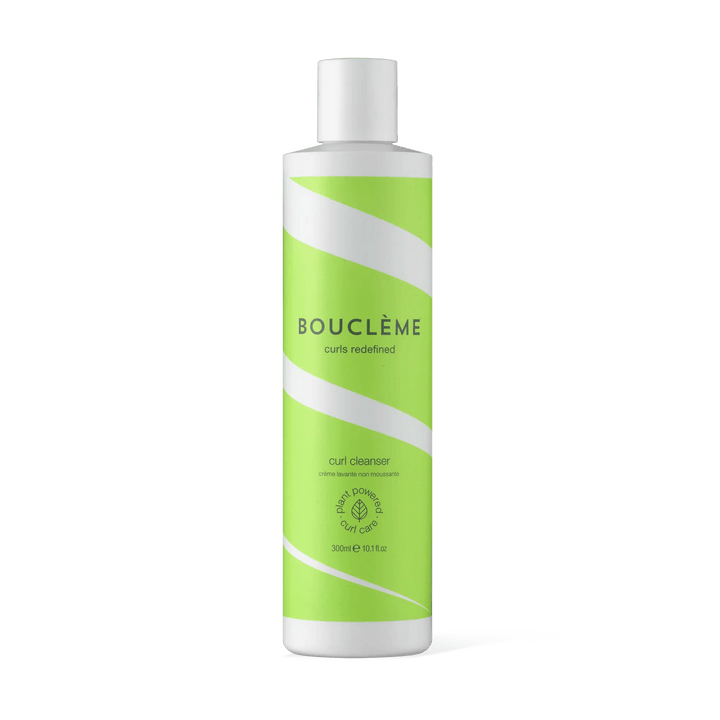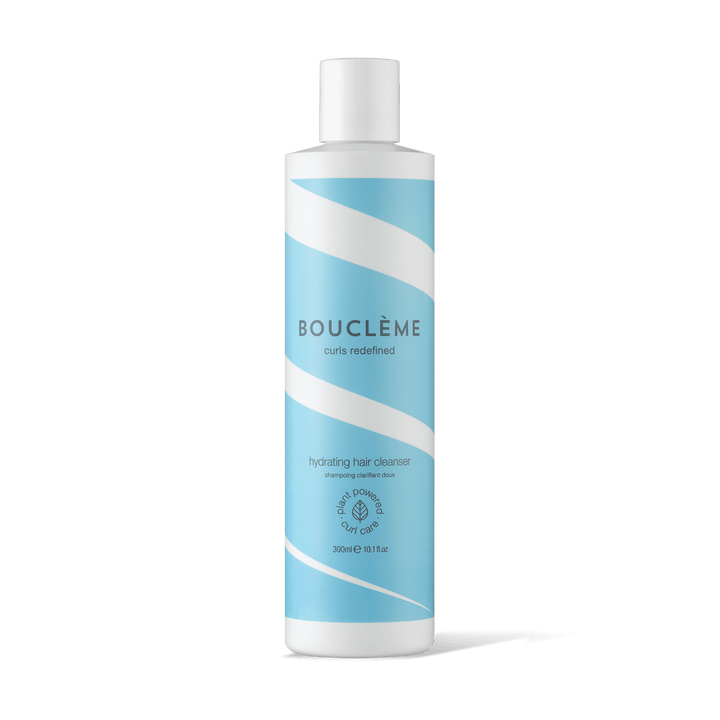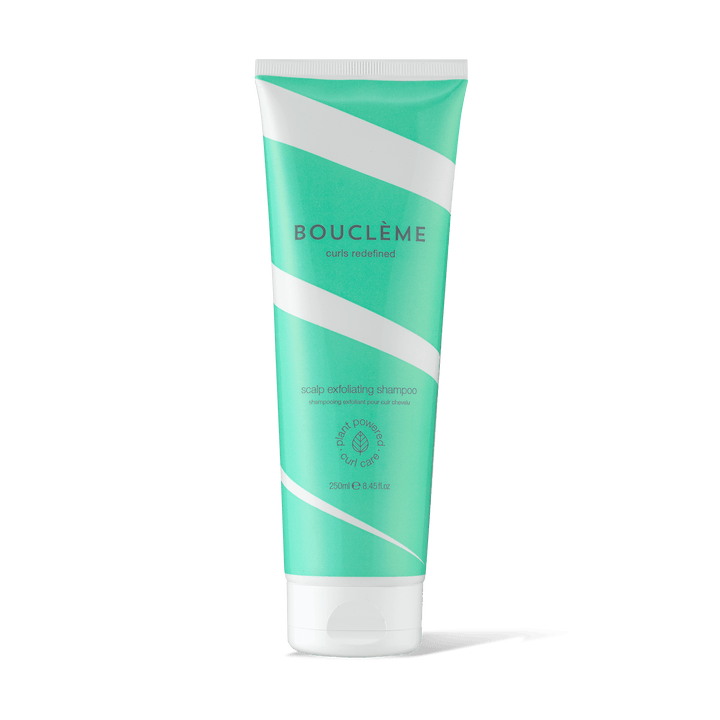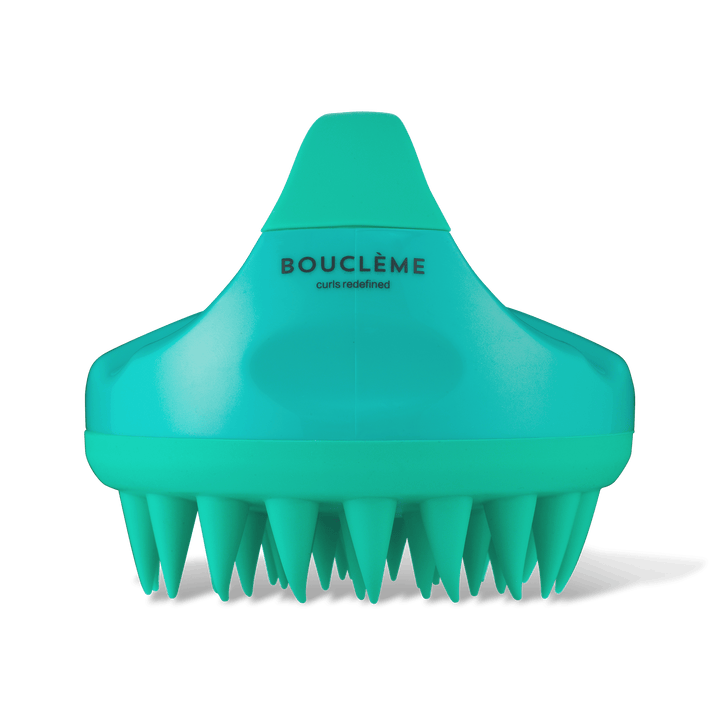Cleansing 101: Bouclème’s Guide To Shampoo For Curly Hair
In the realm of curly hair care, every step in the Bouclème curl system is a crucial piece of the puzzle. Moisture and definition dance hand in hand, but the key player is the first step: the humble cleanser – and sometimes the hardest part of haircare to get right.
Here, we delve into the intricate art of cleansing, shedding light on how it sets the stage for the perfect curls, how to find the right cleanser for your curl type and texture and understanding when and how to use it for your hair.
Getting the most out of your natural curls is all about consistency. It’s a lifestyle, basically.
Why do I need a curly hair shampoo?
Curly hair is prone to dryness and frizz more than any other hair type. And washing with a typical shampoo strips out any natural moisture.
Bouclème’s curly hair shampoos, however, are specifically formulated with fewer harsh chemicals and enriched with moisturisers. They’re more gentle on your scalp and reduce friction between hair strands.
Supermarket shampoos and sulphates

Most shampoos contain compounds called surfactants that lift oily dirt away from the hair and scalp, allowing it to be easily rinsed away. Among these are lathering agents called sulphates – sodium lauryl sulphate, or SLS (the most infamous) – which strip your hair of its natural oils and moisture. Before you know it, you’re compensating with conditioner or even hair masks every time you wash.
Your first step should be to ditch your shampoo – or at least the sulphate-, silicone- and detergent-laden versions that line supermarket shelves.
What’s the difference between shampooing and co-washing?
- Shampooing aims to remove oil and build-up from the hair and scalp. They contain harsher anionic surfactants that create a lather.
- Co-washing washes the hair with a conditioner instead of a shampoo, aiming to ease hair dryness, reduce breakage and moisturise. Conditioners contain cationic surfactants which do not create a lather. Rather, they stick to the surface of the hair, coating it.
What is the best shampoo for curly hair?
So, what does your curly hair actually need? Yes, it needs gentle cleansing, but it also wants to be moisturised. Curls therefore love no-sulphate shampoos, foamless or low-foaming shampoos with increased conditioning properties. Our conditioning cleansers have mild cleansing agents, inspired by ‘co-washing’, a popular method for keeping coily hair clean and odour free with only conditioner, rather than loading it up with drying, frizz-causing, detergent-based shampoos.
Sulphate-free shampoo for curly hair
Go sulphate-free. At Bouclème, our commitment to clean ingredients shines through in our sulphate-free, paraben-free and silicone-free cleansers. Colour remains brighter for longer and scalp and hair dryness should improve – plus, you’ll make a smaller contribution to the environmental impact of detergents.
But what if you’re used to a SLS-based shampoo – will no more detergent really wash? And what if you use lots of heavy oils or butters, and need to deep clean your hair? Let’s establish when you should opt for co-washing over shampoo, depending on what your curls require.
1. Root reset: Scalp Exfoliating Shampoo
Go back to basics and wash away buildup and excess sebum with our Scalp Exfoliating Shampoo. This rich creamy lather contains hydrogenated castor oil beads that gently exfoliate and stimulate, leaving the scalp soothed and invigorated and strands soft and bouncy.
It’s infused with a stimulating and balancing blend of grapefruit, frankincense and mint to refresh and invigorate, while erythritol (a natural moisturiser derived from sugars) smoothes and conditions.
2. Transition period: Hydrating Hair Cleanser
If you want to move on from your foaming shampoo with harsh sulphate-based detergents, your scalp needs time to rebalance. As oil levels go from overproduction to normalising, roots can feel greasy. This transition can take anything from six to 12 weeks. So, your hair needs time to adapt from the products and system you were using before.
Hydrating Hair Cleanser is ideal for this transition period: mild, low-foaming and perfect for fine hair and oily scalps. It’s also great for melting away buildup from oils, heavy butters or silicones. Most silicones are non-water soluble and require a sulphate-based shampoo to remove them effectively, but this hard-working, gentle cleanser washes away dirt and buildup, without drying out curls. Strands are left refreshed and nourished without being weighed down.
Sea salt adds volume, mongongo oil moisturises and sea buckthorn nourishes and strengthens. The scent of grapefruit, rosemary, palmarosa and patchouli linger, helping you feel balanced and calm all day.
3. Maintenance plan: Curl Cleanser
Once your hair’s used to its new Bouclème regime, it’s time to reach for our Curl Cleanser. Voted Best Shampoo For Curly Hair in the Marie Claire Hair Awards 2019, this creamy, non-foaming cleansing and conditioning wash is ideal for dry curls. Often referred to as a co-wash, it blends conditioning ingredients with mild cleansers, like decyl glucoside, to remove dirt and buildup and keep greasy roots at bay, while still nourishing curls. It leaves the scalp feeling clean and curls silky and hydrated.
Argan oil boosts shine and elasticity, aloe vera deepens its cleansing and conditioning powers and virgin coconut oil moisturises and strengthens. Grapefruit, rosemary, palmarosa and patchouli essential oils leave you feeling nurtured and uplifted.
Allergic or sensitive to essential oils? We have a Fragrance-Free Curl Cleanser, too. It’s dermatologically tested and is just as efficient. You get all that amazing curl-cleansing power, minus the scent for zero irritation.
How to maintain a healthy scalp

The journey to beautiful locks begins at the roots – quite literally. At Bouclème, we believe in the connection between a healthy scalp and the radiance of your curls. Consider the scalp as the foundation of your hair. A healthy scalp nurtures strong and resilient hair follicles, preventing issues that may impede the growth and vibrancy of your curls. It’s not just about banishing dryness or managing oiliness; it’s about cultivating an optimal canvas for your curls to express their full potential.
Enter the maestro in this orchestration – our Scalp Exfoliating Shampoo. Think of it as a rejuvenating spa day for your scalp – a ritual that goes beyond mere cleansing. The result? A scalp that breathes, a scalp that radiates health and, consequently, curls that reflect that vitality.
How to use
- Wet hair
- Pour into palms
- Massage throughout in a circular motion
- Rinse off thoroughly to remove all the beads.
- Use your fave conditioner to detangle.
Use in combination with our easy-to-grip Scalp Massager – the perfect tool to accompany our Scalp Exfoliating Shampoo or your cleanser of choice for a weekly scalp massage. The silicone tips are flexible and soft to touch, allowing gentle use in small circular motions on your scalp to boost circulation and overall scalp health.
How often should I wash my curly hair?
How often you wash your curls depends on the needs of your scalp and hair. Side note: we would never recommend washing daily: every other day or every two to three days is fine.
Oily scalp
- If you have an oily scalp, fine hair or loose waves/curls, use the Hydrating Hair Cleanser.
- If you wash your hair after the gym or swimming, there’s no need to double-cleanse: one wash is enough.
- If washing once or twice a week, be sure to double cleanse.
Normal scalp
- If you have a normal to dry scalp, alternate between both Curl Cleanser and Hydrating Hair Cleanser to keep moisture levels balanced.
- If you wash your hair twice or more a week, massage Curl Cleanser into your scalp, apply more to the length and finger detangle before rinsing.
Dry scalp
- Those with a dry scalp may only need to wash hair once a week or less.
- Use Scalp Exfoliating Shampoo for a deeper cleanse once a month or as needed.
- Double cleanse with either the Hydrating Hair Cleanser or Curl Cleanser or use both depending on how greasy your roots feel.
- If using both, start with the Hydrating Hair Cleanser massage firmly onto the scalp.
- Rinse then apply the Curl Cleanser again directly onto the scalp, apply more to the length of your hair and loosely detangle.
- Take your time to rinse thoroughly, then follow with your normal routine.
Experiment and explore what works best for you. Be patient – we recommend trialling a new product for at least four weeks to truly see the effects. There is no quick fix. Growing healthy and strong hair is a long-term process, so enjoy the journey!
Need some help along the way? We are excited to introduce our Back to Basics Masterclass series this January. In our commitment to supporting you on your curly hair journey, we're launching a NEW video gallery. Dive into a treasure trove of tutorials and detailed guides, providing you with the tools to sculpt your dream curls. For any questions, reach out to us via email at info@boucleme.co.uk or slide into our DMs on socials.















1 comment
What’s the difference between the hydrating hair cleanser and the hydrating shampoo? Is it just the scent?